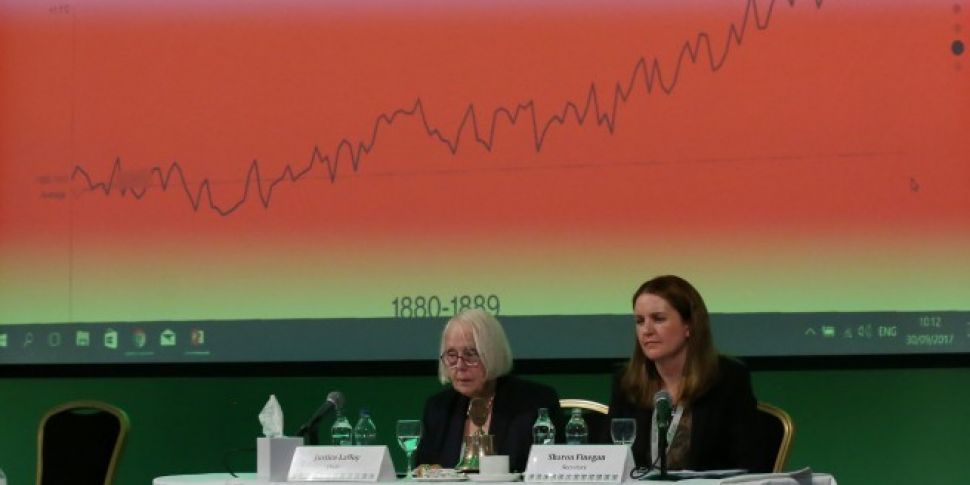Updated 16:05
The Citizens’ Assembly has voted overwhelmingly in favour of all 13 recommendations that were under consideration for tackling climate change.
The results of the secret ballot will now be submitted to the Oireachtas.
The 13 recommendations aim to ensure Ireland catches up with the European average – and bring us closer to our 2020 target.
Only two recommendations received less than 90% support.
The introduction higher taxes on carbon incentive activities recieved 80% support.
While 97% said the State should end all subsidies for peat extraction, 61% said they should be phased out over a five year period while 39% said they should be ended immediately.
The results announced this afternoon were:
On Question 1: 97% said the a new or existing body should be urgently introduced or financed and given a broad range of new functions and powers to urgently address climate change. 3% voted against.
On Question 2: 100% said the state should take a leadership role in addressing climate change through a range of mitigation measures.
On Question 3: 80% said they would be willing to pay higher taxes on carbon incentive activities – 20% said they would not.
On Question 4: 96% said the State should undertake a “comprehensive assessment of the vulnerability of all critical infrastructure in order to build resilience to extreme weather events. 4% were opposed.
On Question 5: 99% said the State should allow citizens to sell energy they produce privately back to the State “at a price that is at least equivalent to the wholesale price. One person voted against the proposal.
On Question 6: 100% said the State should encourage communities to develop their own renewable energy projects and require all “developer-led projects to make share offers to communities” to encourage greater local involvement.
On question 7a: 97% said the State should end all subsidies for peat extraction – and spend the money on peat bog restoration and protecting the rights of workers impacted by the change. 3% voted against.
On question 7b: 61% said that the State should end the peat extraction subsidies over a five year phased period. 39% said the subsidies should be ended immediately.
On Question 8: 93% said the number of bus lanes, cycle lanes and park-and-ride facilities should be greatly increased over the next five years – with “much greater priority” given to these modes of transports over the use of cars. 7% voted against.
On Question 9: 96% said the State should immediately implement a range of measures to support the transition to electric vehicles. 4% said it should not.
On Question 10: 92% said the State should prioritise spending on public transport over new road infrastructure at a rate of no less than 2-to-1. 8% voted against.
On Question 11: 89% said there should be a new tax on greenhouse gas emissions from agriculture – with rewards for land management that “sequesters carbon.” Revenue for the tax would be ring-fenced to support climate friendly farming practices. 11% voted against.
On Question 12: 93% said the State should introduce a standard system for measuring and reporting food waste at all levels of the food supply chain. 7% voted against.
On Question 13: 99% said the State should review and revise regulation and supports for land use diversification – such as supports for the planting of forests. 1 person voted against.
Futureproof
Earlier, professor John Fitzgerald, the chair of the Climate Change Advisory Council warned that we need to start think far into the future.
“Another problem for policy makers and for us all is that we don’t know actually the road to 2050 – to where we want to get,” he said.
“If for example we go for electric cars – and that looks like part of the way we are going to deal with this problem – what happens if electricity is still being produced with coal?
“So we need to map out – if we are going with electric cars – we need electricity to no longer be produced with fossil fuels by 2050.”
Climate targets
This was the fourth time the Assembly has met to discuss climate action.
Delegates heard that the world is facing major problems – with Ireland set to miss its climate targets by a wide margin.
This morning, the Climate Change Advisory Council told members that it is extremely difficult to convince people to engage with initiatives that have little reward in the short term.
Professor John Fitzgerald, Chair of the Council said we need to plan for the future:
“The problems are going to be much worse for my children, they are going to be much worse for my grandchildren,” he said.
“I’ll be dead before things really get bad as a result of climate change.
“So what we are doing is we are asking ourselves to make decisions today that aren’t really going to benefit us.
“There will be some benefits in terms of health, in terms of air quality and in terms of warmer homes - but the real benefits will come to future generations.”
Renewable energy
Yesterday, the meeting in Malahide in Dublin heard from a range of experts, including a session with the Danish Climate and Energy Minister.
Almost a third of Denmark's total energy consumption comes from renewable energy – while 50% of its electricity comes from wind energy.
Minister Connie Hedegaard says international efforts are being made to tackle climate change:
“At the international level, we now have the Paris Agreement and we have an agreement on the 17 sustainable development goals,” she said.
“At the EU level we have 22 targets and we have also set 30 targets for renewables, energy efficiency and CO2 reduction.
“And then we must have national action and local action happening.”
The Assembly will meet again on the 13th 14th of January 2018 to consider the way referendums are held in Ireland.









